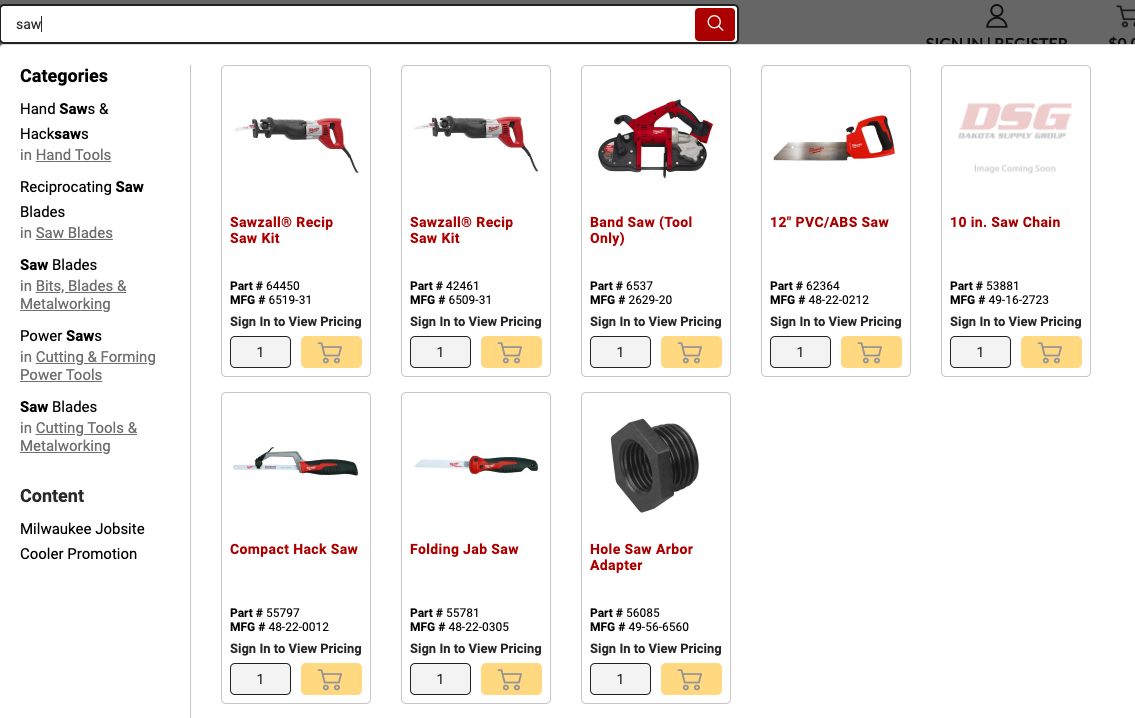5 practical tips for improving the search experience on your B2B ecommerce site
When it comes to search, we’ve been pretty blessed with optimal experiences in our personal shopping lives. You could say we’re spoiled. As consumers, we’re used to seeing thousands of Google search results and near perfect search experiences on marketplaces like Amazon.

Morgan Short

Searching has become second nature. “Google it” has become a verb. Google processes over 3.5 billion searches per day. Google has mastered search by staying hyper-focused on the needs of their users over the years. Our customer experience expectations are extremely elevated and we have companies like Google and Amazon to thank for that.
Unfortunately, B2B ecommerce sites have a bit of catching up to do when it comes to their on-site search experiences. Don’t get me wrong, B2B companies don’t have to be Google or even Amazon. However, B2B buyers have come to expect the same buying experiences they have in their personal lives. Fine-tuning search on your B2B site has the power to make or break those experiences.
B2B companies definitely have unique challenges to getting search right. B2B product catalogs are usually larger, containing more SKUs and more product information. Plus, products are often far more complex with varying attributes.
The good news is, with the right search functionality and an effective strategy, you can gain control over some of the aspects of the B2B search experience. In some cases, you’ll need to rely on your ecommerce or search vendor to make improvements, but in this article, we’ll focus on providing tips that you can implement on your own, right away.
Elements of search
Before we dive into the tips, it’s important to first provide an illustration of what search is and highlight the various elements of search that amount to the common, seamless search experiences that we have grown used to.
First, there’s core search capabilities, like those found in Optimizely B2B Commerce Cloud. This includes configuration, boost and bury, faceting and sorting. Core search enables your customers to find information faster and helps business users create better experiences.
Beyond core search capabilities, semantics like natural language processing, machine learning and AI also play a role in the search experience.
Search should also adapt to personal data that the engine collects. Experiments, testing and analytics make search even more powerful. At Optimizely, we aspire to build out more powerful search experiences for our B2B and B2C solutions.
Why search is important to the B2B ecommerce experience
Let’s examine just how essential search is to the B2B ecommerce experience.
To begin their researching journey, B2B buyers rely on Google. In fact, 73 percent of global traffic to B2B company sites originate from search engines.
When users arrive to B2B ecommerce sites, behavior is no different. Often, they have a product in mind and know exactly what they are looking for. When they can’t find the information they are looking for, frustration ensues. Gartner recently conducted research to identify the most common B2B buying frustration points and “difficulty finding specific information” was cited as the top source of frustration.
Optimizely customer, Dakota Supply Group, recently shared just how important search is to improving the customer experience and driving more conversions. Compared to users who do not leverage search functionality while visiting dsgsupply.com, users who engage with search during their session result in the following:
- The conversion rate increases to over 4x
- Revenue per session increases 3x
- Session times increase by 5x
- Pageviews increase 5x
A search can trigger a powerful, seamless user experience, or it can trigger frustration and distrust with your ecommerce site. B2B companies who are willing to invest time and resources into their search program will deliver better experiences, outpace competitors and ultimately convert more business.
The first step to making search better is, of course, to feed the best and cleanest data possible into your site. You’ll want to ensure all your products have accurate and clear descriptions, titles, keywords, images, videos and other important product information.
Then, you’ll want to dive into whatever analytics and data is available to you so you can understand how your customers are using your site search in its current state.
Once you’ve taken care of those two things, there are multiple steps you can take to make your on-site search experience sing.
Practical tips for improving search on your B2B ecommerce site
Dissect zero search results
Be sure to start by diving into the search results you are seeing on your website. Really dissect the searches that are returning zero results to your users. What are your users looking for that they aren’t finding? How can you tune search to better answer your customers’ questions?
In the zero search results you might find random product numbers, misspellings, synonyms you hadn’t previously thought of or even problems your customers are having. This step will reveal plenty of opportunities and inform how you can better tune your search engine.
Add synonyms and keywords
Each industry in B2B has their own vernacular, so configuring search synonyms is especially crucial in B2B. Think through common jargon, acronyms, and industry terms to start building a synonyms list and improve your customers’ search experience.
Here are a few useful ways to use synonyms with examples from the plumbing industry:
- Acronyms – “GPF” is an acronym for “Gallons per flush”
- Abbreviations - “Sweat” can be shortened to “SWT”
- Alternate Words - “Riser” can also be referred to as “Supply Line”
- Competitive Brand Names - “Kohler” competes with “Delta”
Leverage boost and bury functionality
If you’re leveraging a platform like B2B Commerce Cloud, you have access to built-in boost and bury capabilities allowing you to control the order in which search terms are presented.
When you’re a manufacturer or distributor with hundreds of thousands of SKUs, this can really come in handy. Especially if you’re continuously building out your catalog. You can boost newer products over older ones. Additionally, you can boost customers’ historical purchases so what they’ve previously purchased is found closer to the top of their search results. To become even more relevant to specific customer groups, Optimizely B2B Commerce Cloud lets you use different boost values for products with different customer segments.
Add previews of search results into the search bar
Powerful B2B commerce search engines will enable you to display images, short descriptions, part numbers and even add-to-cart options right into the search bar. Here’s an example on dsgsupply.com of a search for "saw".

Notice that this inquiry delivers relevant categories and products right within the search bar. You can also preview images and easily add the products to your cart without ever leaving the search bar.
Use stocked products and previous purchases to inform your search
B2B Commerce Cloud provides some intelligent search filters specifically targeted for B2B customers. B2B buyers want ordering to be as fast as possible and sorting through numerous search results can slow them down. Turning on a filter that allows customers to only see products they’ve previously purchased can dramatically reduce the number of products in search results – speeding up the buyer’s process. Additionally, for convenience, buyers may only want to view products that are currently “stocked” to avoid long lead times. Another simple filter that is built-in to B2B Commerce Cloud makes this easily possible.
Building a better search engine within your ecommerce website helps your customers find what they need to find, make the purchase, and get on with their day. Better search equates to a better overall experience. Keep in mind, search also has the power to get information in front of customers that they might not have been looking for otherwise.
Take search powered by AI, for example. We haven’t even touched on how facets of search like natural language processing or machine learning, can enhance the search experience even further. AI can help you make better decisions, convert more sales and personalize the experience. But that’s a topic for another day, because this article was focused on giving you practical advice that you can apply to your site today.
If you want to see how AI can improve your commerce experience and help you automate personalized experiences at scale, you may want to take a minute to learn more about Optimizely’s Intelligence Cloud. Or, you can learn more about search functionality in B2B Commerce Cloud here.
